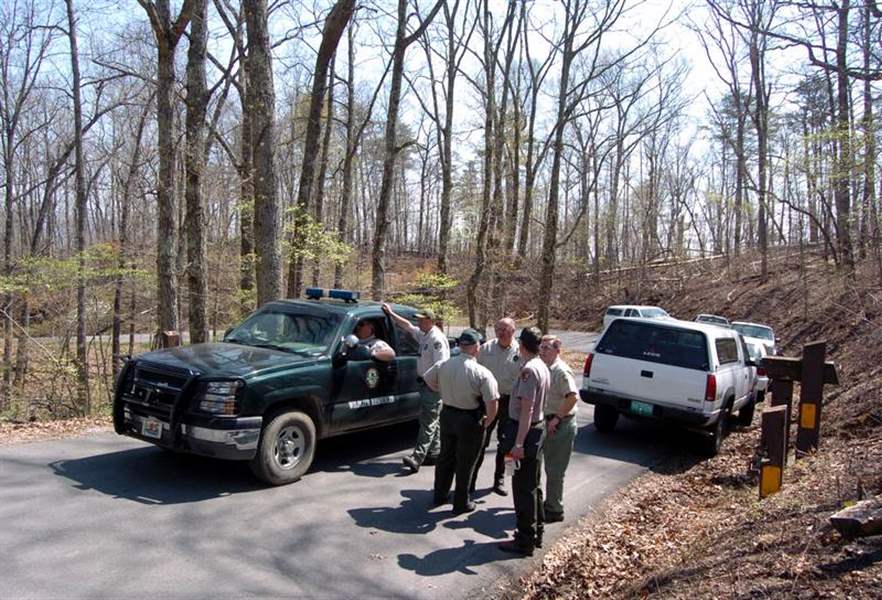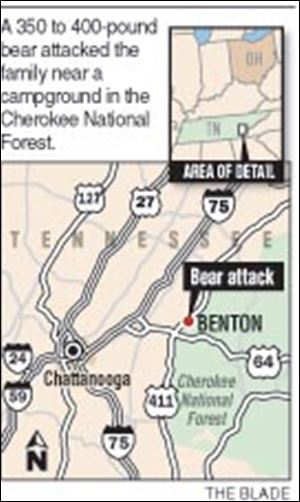
Black bear mauls trio from Clyde, killing girl
4/15/2006
Offi cers from the Tennessee Wildlife Resources Agency gather near the Chilhowee campground where a black bear mauled three members of a family from Clyde, Ohio, on Thursday.

Petrasek
BENTON, Tenn. A Clyde, Ohio, family was attacked Thursday by a black bear that killed a 6-year-old girl and mauled her mother and 2-year-old brother while they were visiting a national forest near here.
The girl who died from the attack was Elora Petrasek. The mother, Susan Cenkus, 45, was taken to Erlanger Hospital in Chattanooga, Tenn., where she was in critical condition. The boy, Luke Cenkus, was taken to T.C. Thompson Children s Hospital in Chattanooga, where he was in stable condition.
In a statement through the U.S. Forest Service, the family said it is grateful for the concern, prayers, and well wishes it has received during this time of tragedy. Their lives have been forever altered by what has happened, the statement read, and they appreciate time to focus on the loss of the girl and the recovery of the mother and son.

Offi cers from the Tennessee Wildlife Resources Agency gather near the Chilhowee campground where a black bear mauled three members of a family from Clyde, Ohio, on Thursday.
Ms. Cenkus is a registered nurse at Bellevue (Ohio) Hospital in the family birthing center, a hospital spokesman said, adding that the hospital extends its deepest sympathies to the Cenkus family.
The 350 to 400-pound bear attacked the family shortly before 4 p.m. Thursday at a waterfall near a campground close to the Cherokee National Forest after several adult visitors tried to drive it off the trail, said Dan Hicks, a spokesman for the Tennessee Wildlife Resources Agency.
Moments before the attack, other children running on a trail noticed the bear and told some nearby adults. It appears the bear followed them to the area near the waterfall where the Cenkus family and others were swimming in a pond, Mr. Hicks said.
The bear bit the boy s head, then went after the child s mother after she tried to fend off the attack with rocks and sticks, Mr. Hicks said.

The boy suffered a bite wound that punctured his skull.
The animal picked up Ms. Cenkus with its mouth and dragged her off the trail. She had eight puncture wounds to the neck and too many claw and tooth injuries to count elsewhere on her body, doctors said.
The girl apparently ran away and, about an hour later, was found about 100 yards away with the bear hovering over her body. A rescuer fired a shot that scared the animal off, Mr. Hicks said.
Authorities said they did not know whether the bear was wounded.
Dogs failed to pick up the bear s trail in an overnight search, and authorities set out traps yesterday in the 1,000-acre area around the attack site in hopes of catching the bear.
It was only the second documented attack on a human by a black bear in modern Tennessee history.
There is a chance that the same bear would attack someone else, so I hope they do catch him, said Lynn Rogers of the North American Bear Center in Ely, Minn.
Black bears generally avoid humans, animal experts said.
Rangers at the Cherokee National Forest, where the attack took place, said a disease, tumor, or parasite might have made the animal more aggressive. The forest is home to about 1,500 black bears, according to the U.S. Forest Service.
Ms. Rogers said there have been only 56 documented killings of humans by black bears in North America in the last 100 years. The current population of black bears in North America is about 750,000, and there generally is fewer than one killing a year.
In May, 2000, a woman was killed by a black bear near Gatlinburg, Tenn., as she walked on a trail near a Smoky Mountains campground.
Joe Clark, a wildlife ecologist with the U.S. Geological Service who has been studying black bears for about 20 years, said injuries or sickness can make them more aggressive. They also might attack when surprised or, in the case of females, to protect their cubs.
I ve never experienced any type of aggression in all my time in the woods, he said. Typically, you won t encounter one because they sense your presence a long time before you sense theirs.
As the populations of people and bears continue to grow, there will be more opportunities for this type of thing, Mr. Clark said. We are dealing with a large, powerful wild animal.
Another theory is that the bear might have recently come out of its semihibernation and was eager to get food, Mr. Hicks said.
It s the springtime and, of course, they ve got to move, he said. One of the theories was that this bear woke up from a semihibernation period and it was starving to death and was going to eat whatever it could get.
If that was the case, Mr. Hicks said, the traps with food should lure the bear.
Other theories discussed by officials were that the bear might have been aggressive because of competition between males marking their territory or the family might have recently cooked something that attracted the bear, Mr. Hicks said.
Authorities at the Cherokee National Forest said that if the animal is captured, it will be killed so tests can be done to determine if it was ill.
We may never find it, Mr. Hicks said. It may be on the top of another mountain by now.
The attack occurred in a mountainous area, 10 miles from the nearest highway. The national forest covers 1,000 square miles along the Tennessee-North Carolina border.
No more than six groups of campers were at the campground at the time, and they were evacuated after the attack, Mr. Hicks said.